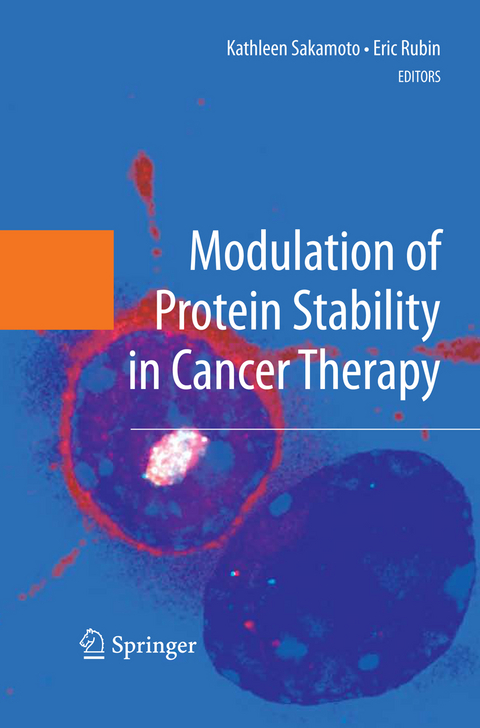
Modulation of Protein Stability in Cancer Therapy
Seiten
2010
|
Softcover reprint of hardcover 1st ed. 2009
Springer-Verlag New York Inc.
978-1-4419-2401-8 (ISBN)
Springer-Verlag New York Inc.
978-1-4419-2401-8 (ISBN)
This comprehensive monograph on the role of protein modulation in cancer therapeutics focuses on targeting molecules that regulate protein stability in a variety of tumors. Topics covered include ubiquitin ligases, deubiquitinating enzymes, and the proteasome.
Over the past two decades, there has been a tremendous increase in our understa- ing of ubiquitination and proteasome degradation. As the editors, we thank Springer Publishing for allowing us to organize this collection of reviews on the ubiquit- proteasome system, oncogenesis, and cancer therapy. We asked our colleagues, who are experts in the field, to provide an overview of their research and recent progress. Each chapter covers a broad range of topics that include defects in ubiquitination identified in specific tumors to new directions to treat cancer. In the Introduction, Rati Verma gives the background of our current understanding of the proteasome. A general overview of ubiquitin ligases and cancer is provided by Angelika Burger and Arun Seth. Patricia McChesney and Gary Kupfer discuss the role of the Fanconi anemia/BRCA1 pathways in breast cancer and potential targets for therapy. Defects in the tumor suppressor, von Hippel-Lindau E3 ligase, and the role of this protein complex are discussed by William Kim and William Kaelin. Kyung-bo Kim and colleagues describe the development of novel proteasome inhibitors to treat cancer patients.
Progress in our understanding of deubiquitinating enzymes is summarized by Massimo Loda and his colleagues. Finally, Agustin Rodriguez-Gonzalez and Kathleen Sakamoto discuss an approach to recruit cancer-causing proteins to ub- uitin ligases through a chimeric molecule known as protacs.
Over the past two decades, there has been a tremendous increase in our understa- ing of ubiquitination and proteasome degradation. As the editors, we thank Springer Publishing for allowing us to organize this collection of reviews on the ubiquit- proteasome system, oncogenesis, and cancer therapy. We asked our colleagues, who are experts in the field, to provide an overview of their research and recent progress. Each chapter covers a broad range of topics that include defects in ubiquitination identified in specific tumors to new directions to treat cancer. In the Introduction, Rati Verma gives the background of our current understanding of the proteasome. A general overview of ubiquitin ligases and cancer is provided by Angelika Burger and Arun Seth. Patricia McChesney and Gary Kupfer discuss the role of the Fanconi anemia/BRCA1 pathways in breast cancer and potential targets for therapy. Defects in the tumor suppressor, von Hippel-Lindau E3 ligase, and the role of this protein complex are discussed by William Kim and William Kaelin. Kyung-bo Kim and colleagues describe the development of novel proteasome inhibitors to treat cancer patients.
Progress in our understanding of deubiquitinating enzymes is summarized by Massimo Loda and his colleagues. Finally, Agustin Rodriguez-Gonzalez and Kathleen Sakamoto discuss an approach to recruit cancer-causing proteins to ub- uitin ligases through a chimeric molecule known as protacs.
Ubiquitin Ligases and Cancer.- The 26S Proteasome as a Therapeutic Target in Cancer: Beyond Protease Inhibitors?.- Targeting HAUSP: Killing Two Birds with One Stone.- Modulation of Protein Stability: Targeting the VHL Pathway.- Interrelationship of the Fanconi Anemia/BRCA Pathway.- Targeting the Sumoylation Pathway.- Proteasome Inhibitors.- Targeting Deubiquitinating Enzymes.- Proteolysis Targeting Chimeric Molecules.
| Zusatzinfo | 35 Illustrations, black and white; X, 165 p. 35 illus. |
|---|---|
| Verlagsort | New York, NY |
| Sprache | englisch |
| Maße | 155 x 235 mm |
| Themenwelt | Medizin / Pharmazie ► Medizinische Fachgebiete ► Mikrobiologie / Infektologie / Reisemedizin |
| Medizin / Pharmazie ► Medizinische Fachgebiete ► Onkologie | |
| Studium ► 2. Studienabschnitt (Klinik) ► Humangenetik | |
| Studium ► Querschnittsbereiche ► Infektiologie / Immunologie | |
| Naturwissenschaften ► Biologie ► Biochemie | |
| ISBN-10 | 1-4419-2401-9 / 1441924019 |
| ISBN-13 | 978-1-4419-2401-8 / 9781441924018 |
| Zustand | Neuware |
| Haben Sie eine Frage zum Produkt? |
Mehr entdecken
aus dem Bereich
aus dem Bereich
Eine sehr persönliche Geschichte | Der New York Times-Bestseller
Buch | Softcover (2023)
Ullstein Taschenbuch Verlag
CHF 30,75
Die revolutionäre Medizin von morgen (Lifespan)
Buch | Softcover (2020)
DuMont Buchverlag
CHF 22,40


